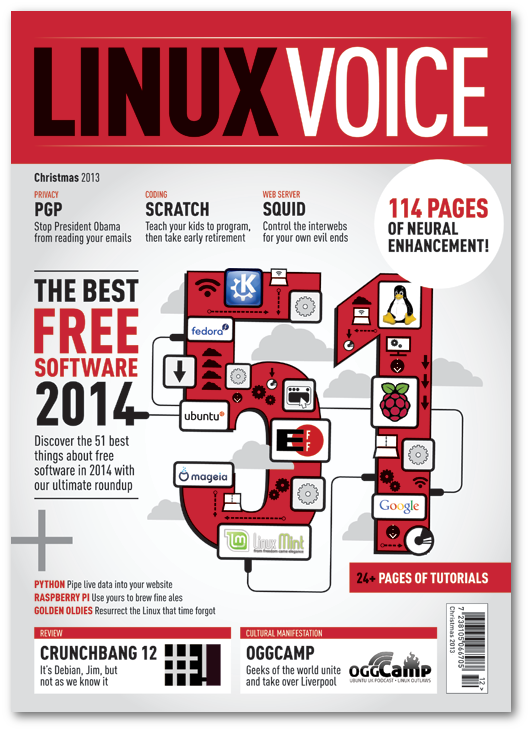11.18.13
Posted in GNU/Linux, Site News at 7:40 am by Dr. Roy Schestowitz
Summary: Why privacy is becoming a matter of priority in this Web site
TechRadar has a new article [1] about best GNU/Linux desktops, but it also started a wider discussion [2] about which distro is best for protecting the users’ privacy [3]. The author’s selections are IprediaOS, Liberté, Privatix, Tails, and Whonix. Most desktop users are still stuck with Windows, which is developed by the NSA and its partner Microsoft (both are involved in development), so there is a huge audience to whom we can advocate privacy-respecting operating systems. Techrights‘ in-progress redesign is emphasising privacy, not corruption from the likes of Novell or Microsoft. Software patents are also taking lower priority for the time being as it’s expected that more people will discover software freedom owing to privacy scandals, not outrageous patent policy or competitive abuses (which unlike privacy don’t affect them directly). █
Related/contextual items from the news:
-
Linux is about choice, or so the popular mantra goes, and nothing represents this more than the plethora of desktop environments on offer. Most distros have at least five graphical environments in their repositories, and some offer double-digit numbers of choice. But why? What’s the point of all this? Surely it’s not a question of having a lot of desktop environments, but of having a single one that works properly. Well, maybe.
-
Privacy is in the news right now, with many people concerned about the NSA spying scandal, identity theft and hacker intrusion into their computers. TechRadar has an overview of the best Linux distros for protecting your privacy.
-
Permalink
 Send this to a friend
Send this to a friend
Posted in GNU/Linux at 7:22 am by Dr. Roy Schestowitz
Summary: Regaining community control of the development, communication, and distribution of GNU/Linux
“Linux Voice”, a promising new magazine which we mentioned the other day, is managing to raise a lot of funds after some initial coverage in the big media [1], leading to more such coverage in other news sites [2,3] and FOSS-centric news sites [4]. As “Linux Voice” is funded by people — not advertisers — it will not need to publish things which are friendly to companies. It can blast the NSA and the CIA, or even accuse certain companies of corruption. That’s just what we need. This magazine may also involve some multimedia/audiocasts — something which is sorely needed these days because FOSS-centric audiocasts are growing fewer (although they exist [5,6]). About 5 years ago there was far more hype driving demand for GNU/Linux on the desktop. Pre-loaded Linux was really needed at the time (GNU/Linux was harder to install/set up and it is still not so trivial [7]) and when Dell finally budged many of us celebrated with caution. Dell is now dominated by Microsoft and we should expect its GNU/Linux-powered machines to have Microsoft ‘patent tax’ [8,9,10]. If people want to buy a machine that has GNU/Linux preinstalled (no spyware like Ubuntu and no Microsoft tax), then Chromebook, which is also spyware, is one affordable option [11] although it would be best to support the small players — those to whom GNU/Linux is a matter of strategy and priority. See the Pre-Installed Linux Vendor Database for options near you. Even if those options are relatively expensive, these at least go a long way in supporting those who support GNU/Linux. The cost of free (as as in freedom) press can be high and the same goes for Free software. Freedom is no self-funding; usually the opposite is true. █
Related/contextual items from the news:
-
A group of staff who walked out a month ago from the computing magazine Linux Format are hoping to launch a rival monthly magazine of their own called Linux Voice.
They have launched a crowdfunding campaign in the hope of raising £90,000 to get their project off the ground – in print and in a digital format – by February next year.
-
-
-
-
-
-
Recently, I’ve been looking to purchase a new machine. This all started with the problems I experienced with a new Lenovo desktop machine and PulseAudio (I’ve been going on about this for a while now). That same machine, which is less than a year old, has now started to display a newer, more frustrating issue of randomly powering off. Sure, there are a litany of possible reasons for this, including:
Bad power supply (haven’t checked this)
Bad CPU fan (not the issue)
Bad RAM (all RAM passes Memtest86+)
Bad hard drive(s) (both drives passed e2fsck)
-
-
-
-
Dell has shipped a second update to its Ubuntu-powered Project Sputnik developer laptop, and its engineers have begun testing other Dell portables with an eye to offering an even more powerful Linux workstation.
Permalink
 Send this to a friend
Send this to a friend
11.17.13
Posted in GNU/Linux, Kernel, Security at 9:07 am by Dr. Roy Schestowitz
Why did Linus Torvalds keep quiet about it?

Summary: The NSA asked Linus Torvalds, the founder of Linux, to put back doors inside Linux
Time to ban the NSA from Linux development? Probably.
The NSA has been subverting standards to make the world less secure for everyone (using pseudo-encryption everywhere) and now we understand Torvalds’ weird dodging from the question about NSA requests for back doors [1, 2], not to mention past attempts at back door inside Linux. Linus Torvalds’ father, who is an MEP (here is his Web site), finally does what his son, who is based in the US and is now a US citizen, did not do. He has just revealed that the NSA did ask Linus to backdoor Linux [1] (like Windows).
In light of these revelations we probably should ban the NSA from getting involved in Linux, including SELinux. The NSA has been abusing the whole world (even allies) and breaking the law, so why trust it? Moreover, as revealed in the news some days ago [2,3], there may already be some back doors in Linux, but they are well disguised. █
Related/contextual items from the news:
-
The NSA has asked Linus Torvalds to inject covert backdoors into the free and open operating system GNU/Linux. This was revealed in this week’s hearing on mass surveillance in the European Parliament. Chalk another one up of the United States NSA trying to make information technology less secure for everyone.
-
-
Permalink
 Send this to a friend
Send this to a friend
11.14.13
Posted in GNU/Linux at 9:06 pm by Dr. Roy Schestowitz

Summary: The landscape of GNU/Linux-centric news continues to change as people who “beat the C.I.A. before it was cool [and] sent a comfort package to Edward Snowden” take off with huge public support
Andrew Gregory, Mike Saunders, and Ben Everard are raising funds for “Linux Voice“, a new magazine which marks “new beginnings” [1] for these three writers (Linux Format staff which decides to leave after this new issue [2]). Given the changing landscape of the GNU/Linux world, longtime journalists in this area have warped their writing habits (one prefers a potpourri of news [3] and Techrights/Bytes Media acquired Tux Machines to also deliver a potpourri of news without commentary). “Linux Voice” has already raised over $30,000, so it will hopefully grow feet and becomes a force in the media. Its authors are really not shy of politics, as demonstrated by their words and portfolio of works. Like Techrights, they are increasingly concerned about privacy and security. Linux Format, which once put Techrights in the front page, is also not totally apolitical (like many of us in Britain).
Support those folks who are raising funds right now. Let’s hope that “Linux Voice” really becomes the voice of Linux because we need more opinionated people out there speaking for us. The Linux Foundation sure won’t do it, it’s just a marketing apparatus of affluent executives (corporations that fund it). █
Related/contextual items from the news:
-
But it’s time to move on, and I’m sorry to report that this will be my last issue here at Future Publishing. Andrew Gregory and Ben Everard have also decided to leave, so it’s something of a new beginning at Linux Format Towers. I’ve had some wonderful times here, from interviewing Linus Torvalds and breaking the Raspberry Pi story, to challenging expectations with our ‘Learn to Hack’ and ‘Beat the CIA’ features, all of which I’m very proud of, especially in the light of recent surveillance revelations.
-
-
The first Linux distribution just keeps on going. The latest iteration is the Slackwar 14.1 release which debuted on November 4th.
Permalink
 Send this to a friend
Send this to a friend
Posted in Free/Libre Software, GNU/Linux at 4:29 am by Dr. Roy Schestowitz

Hillsboro; Work by M.O. Stevens
Summary: Reports say that the Hillsboro School District is moving to GNU/Linux and other bits of news indicate growing realisation that in order to educate we must share freely and encourage sharing, too
“The financial reality of the education industry” is the title of a new article from OpenSource.com (Red Hat-run). It says [1] that “[h]igher education is not just about producing valuable workers, but about educating people to become thinking, lifelong learners who contribute in many positive ways to society, be that local or global.” In reality, however, based on emerging trends and disturbing new evidence, the schools system is about indoctrination and curriculum is set by those in power in order to help them keep power (or gain wealth). “Center for Copyright Information wants to introduce an anti-piracy curriculum to US schools,” says this new article [2], showing an utter abuse of this system. Contrariwise, in the Hillsboro School District, students are said to be shifting towards GNU/Linux [3] and OpenSource.com promotes the idea of free sharing of information in schools [4,5]. What’s education really about if not free dissemination of important knowledge? Where would schools be if every taught item needed to be “licensed”?
Looking at other areas of the public sector, OpenSource.com writes about Italy [6], South Africa ignores its own Free/Open Source software (FOSS) policies (doing a survey about it instead [7]), and economic advantages of moving the public sector to FOSS are discussed in relation to Ecuador [8] and Vietnam [9], whose economy is relatively weak and could benefit tremendously — in the savings and job creation sense — by moving to FOSS. Countries which teach young people how to use other countries’ software rather than how to develop new software or get involved in development of existing projects are just turning their future generation into clients, not producers. █
Related/contextual items from the news:
-
Higher education is not just about producing valuable workers, but about educating people to become thinking, lifelong learners who contribute in many positive ways to society, be that local or global.
-
COMMON LANGUAGE: Center for Copyright Information wants to introduce an anti-piracy curriculum to US schools.
When it comes to learning about the evils of internet piracy, Hollywood studios and the major music labels want kids to start young.
A nonprofit group called the Center for Copyright Information has commissioned a school curriculum to teach primary-age children about the value of copyrights.
-
The taxpayers have spoken: the Hillsboro School District might need faster computers, but it’s not going to buy them by increasing residents’ property tax bills with yet another bond measure.
The district’s five-year, $25 million bond failed during the Nov. 5 election, with 54 percent of voters rejecting the measure.
So the district is going to have to find another way to provide students with technological opportunities without spending nearly as much. There may be a solution that could speed up the computers, and the best part is that it is free: Ubuntu, an open-source Linux operating system.
-
-
The debate over purpose is whether online material is primarily a financial tool to create new revenue streams by video recording lectures to reach distance and nontraditional students or an opportunity to systemically restructure the substance and nature of higher education.
-
That said, every public body has the same freedom that any non-public body has in determining whether to acquire, develop, and release software under conditions of free and open source software. This is due to the fact that all public administrations in Italy are obliged to distribute to any other public administration all software which has been developed by or for them, in source code and without any charges (called the Reuse Rule). This fits perfectly in an all-free software workflow, where distribution under the Reuse Rule is not restricted to the Italian public administrations, but is public, to everybody.
-
The Department of Public Service and Administration (DPSA) is conducting an impact assessment on the implementation of its free and open source software (FOSS) policy.
-
Here’s a development that could have enormous global implications for the search for a new commons-based economic paradigm. Working with an academic partner, the Government of Ecuador has launched a major strategic research project to “fundamentally re-imagine Ecuador” based on the principles of open networks, peer production, and commoning.
-
Vietnam’s ministries, provincial administrations and municipalities are turning to free and open source, building on European examples, policies and concrete software solutions. To intensify collaboration, a Vietnamese delegation, including representatives from the Ministry of Science & Technology, universities and free software firms, met with the European Commission’s ISA Programme last month.
Permalink
 Send this to a friend
Send this to a friend
11.13.13
Posted in GNU/Linux, Kernel, Tivoization at 11:07 am by Dr. Roy Schestowitz

Summary: Linux gets injected into it some code that potentially ties software to hardware (in the lock-in sense)
Based on antitrust exhibits, Intel’s relationship with Microsoft is complex, but Intel generally uses Windows to keep the Wintel cash cow going. Earlier this year I spoke to Intel employees who run the UEFI Forum (a forum decorated by some more members who help distract from the real dominating force) and I tried to be polite and constructive, advising the head of this forum to withdraw ‘secure’ boot. I didn’t bring up the fact that his employer, Intel, is a criminal company whose former staff plays a big role in parasites like Intellectual Ventures. I just pointed out that my brother in law works for Intel and that perhaps Intel can be changed for the better. But that was too optimistic. The utter mess which is UEFI ‘secure’ boot (harming hardware, not just computing freedom) goes forth and despite the fact that it is bricking devices with Windows on them (apparently things are getting even worse [1]), Linux developers let that nonsense enter the kernel, specifically for ARM [2], where so-called ‘secure’ boot cannot even be disabled.
“This is like another Tivoization taking place and Linux Torvalds, who spoke out against UEFI ‘secure’ boot, will probably just find some excuses for letting it be.”This is probably happening because Intel funds the Linux Foundation. UEFI Forum is Intel is Linux Foundation (in part). That’s how the influence of money works. This is like another Tivoization taking place and Linux Torvalds, who spoke out against UEFI ‘secure’ boot, will probably just find some excuses for letting it be. The situation is similar when it comes to the W3C (Linux Foundation equivalent), where corporate members (like Intel/UEFI Forum) push DRM into the Web while the founder, Tim Berners-Lee, just lets it be, essentially forcing everyone to just swallow the poison, even good forces like Eich/Mozilla [3].
The head of the UEFI Forum mocked or at least dismissed DRM as just for “business models”, but his employer promotes DRM. UEFI ‘secure’ boot — like DRM — is just about business models, so who is he kidding? Likewise, Berners-Lee has many reasons to dislike DRM given his historical background (he created the Web to share his work), yet he keeps defending DRM right now [1, 2, 3]. Are these people thinking for themselves or are they all just blindly/reluctantly following orders of those who pay their salaries? Rather than protect copyright monopolies in their respective areas (which is why the monopolies try to use DRM on the Web) or protect the monopoly of software crooks (who use bribe and sabotage to hold back GNU/Linux) perhaps those influential people should make a brave stand and rise up against corporate takeover, spilling some beans or using public humiliation to drive away the lobbyists. █
Related/contextual items from the news:
-
And then, there’s the celebrated Microsoft update to convert your Windows 8 RT computer into a Windows 8.1 RT… brick! It went so bad that Microsoft had to prevent people from installing it.
I don’t know if they fixed it but, according to this post, the update to Win 8.1 now seems to convert your computer into a cat (because it does not play nicely with mice).
-
While EFI was originally developed by Intel and largely targeting x86 platforms, the EFI 2.3 specification does exist for Itanium and ARM architectures too and early this year the UEFI Forum had shown a proof-of-concept UEFI boot environment for ARMv8. With the EFI pull for the Linux 3.13 merge window, the Linux EFI support extends to ARM.
-
If I didn’t before, after talking to Eich I had a strong sense that Mozilla is constrained by conflicting desires – to do the right thing, for example, while retaining enough browser share that it remains able to do the right thing. As you might expect, there are no easy solutions. Fortunately, things seemed more hopeful regarding another topic we discussed: I’ll be exploring that in my next column.
Permalink
 Send this to a friend
Send this to a friend
Posted in GNU/Linux at 9:27 am by Dr. Roy Schestowitz

My wife’s computer
Summary: Myth-busting regarding the difficulty — or lack thereof — when moving to GNU/Linux on the desktop
EVERYONE in my family (parents, siblings) is using GNU/Linux or has used it in the past. It is not hard; Android is used by almost everyone, but on the desktop too I never really encountered serious support-related issues/questions. So this new article from Life Hacker [1] irked me somewhat. It basically shows some screenshots very selectively and pretends that with Windows there can never be technical challenges (let alone routine complications like viruses, fragmentation, bad patches, lack of software repositories, lack of functionality on the desktop, restarts, freezes and the list goes on and on). Based on my experience, people choose to switch to GNU/Linux because Windows becomes a big mess requiring a lot of technical support, not because they are after a platform which is more complicated and technical. The motivations are technical, not idealogical. My wife uses KDE with multiple desktops, a clipboard stack (through Klipper), bash terminals, and ssh. These are not too hard to grasp, it just takes a bit of adjustment. Those four features are not even basic features, and they aren’t accommodated at all by Windows (in GNU/Linux these are all built in). There is one particular article [2] titled “Confessions of a 40 year old virgin”. Published only a few days ago, the article explains what a new GNU/Linux user may have to go through. It’s nothing too daunting. Slackware 14.1 was released some days ago [3] and it surely targets veteran users of GNU/Linux. It doesn’t need to create a stereotype about the level of difficulty of GNU/Linux, which is basically a stack that suits everyone, provided a suitably simple/advanced desktop front end. Point Linux 2.2 is another distribution which has just come out [4] and it goes a long way in simplifying things; to quote the new review, “Point Linux gives you the ability to watch Flash videos (and play games) as well as listen to MP3s by default.” When it comes to installing new software, it is so much easier than Windows. The ending words of this review say: “Whilst Synaptic isn’t as glamourous looking as one of the many software centres out there it is incredibly functional and gives you full access to repositories.” █
Related/contextual items from the news:
-
In the end, Linux is great for a lot of things, even if you don’t use it as your main OS. It’s perfect for setting up a home theater PC without buying Windows, or reviving a super old machine. But if you want to really dig deeply and use it as your main operating system, just know that things are going to be a little different than Windows or OS X. For some, it’s well worth the effort, but others may find that it’s too much work for little payoff. The only way you can know is to try it out for yourself.
-
Well actually, to be more specific, I was a LINUX virgin who didn’t know the difference between Ubunto (yes, in that spelling!) and Mint. And DarkDuck helped me to ‘pop my cherry’. Now I think that I should stop with the lame sexual analogies before this gets downright weird.
[...]
DarkDuck, the owner of the above mentioned site, suggested that it was probably worth waiting for the latest version and I took his advice, opting for the 64-bit version. The disk arrived a couple of days after the release date for 13.10, and the installation was fast and painless. I found a few tips on the web about configuring the Firewall and so on and now the laptop is working again.
-
Yes, it is that time again! After well over a year of planning, development, and testing, the Slackware Linux Project is proud to announce the latest stable release of the longest running distribution of the Linux operating system, Slackware version 14.1!
-
Point Linux 2.2 is a welcome blast from the past with the way it looks. It reminds you of how good things were back when Gnome 2 was prominent.
The performance of Point Linux on the Toshiba Satellite Pro that I am using is excellent.
I didn’t come across any issues whilst using Point Linux and the experience has been really good.
There is one thing I would like to add though. If I could go back to any point in time in my past then it would be either the 1970s or the 1980s.
I like the 1970s because in my head it would be like “Life on Mars” and I like the 1980s because I have lived through it once already and life seemed easier back then.
The truth is the reason why I would be happy back in the 1980s is because I know what happened and during my 1980s nothing bad happened.
The same can be said of Ubuntu back at version 10.04. I used it. I remember it well. It was great, it was stable and I really liked it and I know nothing bad happened whilst I used it.
Is that a good enough reason to go back in time?
Unity, Cinnamon, Gnome 3. They have all added something new and they are clearly the future of Linux. (Ok KDE as well, if you must).
Point Linux is like a time machine. It gives me back a really good operating system which works in a way I used to work. Do I still want to work that way? I am not quite sure.
Taking it on face value, Point Linux is a really nice operating system that performs well, is easy enough to navigate and has no real major issues. If that is what you need then it is well worth a shot.
Permalink
 Send this to a friend
Send this to a friend
Posted in GNU/Linux, Google at 7:25 am by Dr. Roy Schestowitz

Photo by Derzsi Elekes Andor
Summary: In this age of Android smartphones, tablets, and even Chromebooks, Google’s role as a key player in the GNU/Linux world is debatable
Google is probably Microsoft’s #1 nightmare. It puts in jeopardy the future of both Windows and Office, Microsoft’s few cash cows and monopolies (the latter depends on the former, so when the first is dead, the latter too will die). Google has been receiving a lot of abuse from Microsoft; some examples will be given in the next post. But it is worth thinking what promoting Google would do to GNU/Linux as a free (freedom-respecting) operating system.
“It is very hard to leave anonymous comments on Google-run services and sites.”The other day there was an article titled “Google’s Motorola wants to tattoo a microphone on your neck” [1] and it was based on a patent. Polygraphs are ‘snake oil’, but this is pretty much how this thing gets advertised. It is very Big Brother-like. This is similar to a satirical new article [2] titled “Multiple Wyoming School Districts Implant RFID Chip Technology In Students Without Parental Consent” (untrue) and the true story [3] about Google’s efforts to require real ID on the Web (as demonstrated by Google Plus, in addition to a lot of tracking and a never-dying cookie). One serious problem with Google is its assault on anonymity, which should be considered a crucial tenet. It is very hard to leave anonymous comments on Google-run services and sites.
Richard Stallman, who is far from a Google sceptic, is not too happy with Google’s treatment of anonymity. He writes in his personal Web site: “I reject Facebook and Google+ on principle because they require people to give their “real names”. I am proud to identify myself when stating my views; I can afford to do that because I am in a fairly safe position. There are people who rationally fear reprisals (from employers, gangsters, bullies, or the state) if they state their views. For their sake, let’s reject any social networking site which insists on being told a user’s real name.
“Google+ offers to hide the user’s real name, but demands people prove an “established identity” or provide ID. I am suspicious of this requirement, since it can’t hide the user’s real name from the US government, which has a policy of prosecuting journalists as “spies”.”
“I am suspicious of this requirement, since it can’t hide the user’s real name from the US government, which has a policy of prosecuting journalists as “spies”.”
–Richard StallmanGoogle has done too little to defend Wikileaks and other such efforts; in fact, based on Schmidt’s meeting with Assange, Google is in many ways part of the problem, denying us access to what those in power are trying to hide (e.g. Cablegate). Google says it wants to improve access to information, but Google limits the scope of this information (selectivity) and is increasingly engaging in censorship, too. This is not reassuring. It’s not just something which Google does in China, not anymore anyway.
There are of course other problems with Google, which does too little to oppose NSA snooping. Thankfully, Google hardly makes an effort to pull the files of GNU/Linux users [4], unless of course they use Android, in which case there’s promotion of a so-called ‘feature’ known as remote backup (sending all your personal data — including passwords — to Google’s NSA-accessible datacentres). The situation is similar when it comes to ChromeOS, which GNU/Linux bashers like David Gewirtz seem to have no problem with [5] and colleagues at ZDNet claim to be on the rise [6]. As some GNU/Linux users start to explore ChromeOS [7] as an option (locked down, more surveillance than a typical GNU/Linux distribution), there’s reason for concern and caution; it’s not that ChromeOS (or its “open” equivalent) is malicious, it’s just that it’s a step away from where we wish to be with freedom- and privacy-respecting GNU/Linux. █
Related/contextual items from the news:
-
How to start on this one? Well, Google’s Motorola subsidiary has filed a slightly strange patent with the idea that you should have a smartphone microphone tattooed onto your throat. According to the patent, the tattoo would be placed onto a person’s neck to pick vibrations directly from their larynx.
-
Overall public opinion of the RFID seems to be positive among Hanna’s townsfolk. I spoke with Earl Gentry, a retired miner, longtime resident of Hanna, Wyoming and one of the first recipients of the RFID Chip in his community. He told me the following:
“Heck, I don’t know how I lived without one. I use the RFID Chip at the doctor’s office; I’m able to purchase food and clothing from all my favorite stores. I definitely believe our country would benefit from a federally mandated RFID law.”
-
When we created feedly a few years ago, we made the decision to use Google OAuth as our authentication service. The goal was to let users safely login with their existing Google identity instead of having to create and manage yet another identify.
Google has been slowly transitioning from Google OAuth to Google+ as their unifying identity system. This transition opens the door to interesting opportunities like simpler login across devices – and a lot more.
We are following on Google’s lead and transitioning feedly from Google OAuth to Google+ login.
-
For some reason, Google seems to dislike Google Drive users who prefer Linux. I find this particularly strange, since Google’s Chrome OS is based on Linux.
-
-
Some people are still in denial about the rise of the Linux operating system with the Chrome Web browser interface, Chrome OS, and its hardware: the Chromebooks. The experts say, however, it’s the one segment of the PC market that’s growing while everything else shrinks.
-
I am a rather mobile person. Mobile in the sense of technology I can pick up and relocate at a whim. Even though my primary computer is a gaming desktop, a recent hardware failure helped me to realize that I can be just as productive on my trusty MacBook. My laptop can do just about everything my desktop can (other than running high-end games that is) and my iPad is great for browsing the web and interacting with social media on the go. Last year I took it with me when I went to Disney and it performed very well as a dedicated Reddit, Facebook, Twitter and Kindle client.
Permalink
 Send this to a friend
Send this to a friend
« Previous Page — « Previous entries « Previous Page · Next Page » Next entries » — Next Page »























 Content is available under CC-BY-SA
Content is available under CC-BY-SA